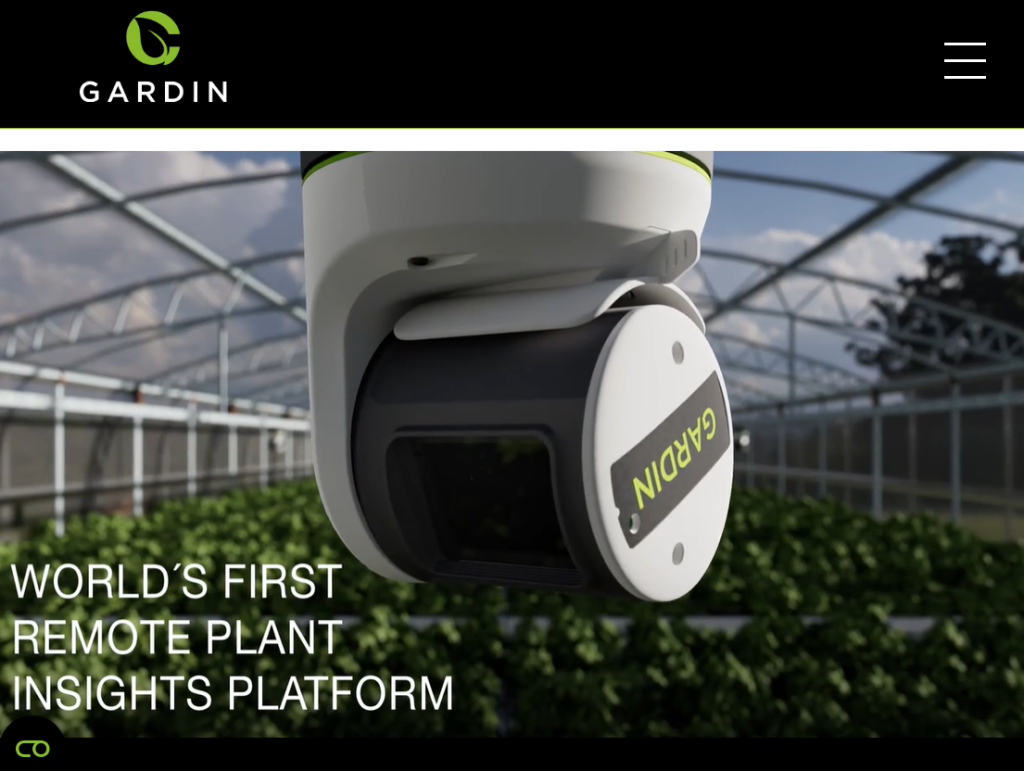Gardin Raises $4.5M to Scale Optical Phenotyping for Smarter Agriculture
July 28, 2025
byFenoms Start-Ups

Gardin, the UK-based agritech startup, has secured $4.5 million in seed funding to scale its next-gen optical phenotyping platform - a breakthrough system that reads plant health in real-time, without touching a single leaf. The round was led by Navus Ventures B.V., with strong backing from Oxford Innovation Finance, LDV Capital, MMC Ventures, Seedcamp, and Alchimia Investments, alongside multiple global angel investors.
Founded by Sumanta Talukdar, Gardin is pioneering technology that combines AI, sensors, and precision optics to capture live plant data - tracking photosynthesis, stress, and nutrient health with non-invasive accuracy.
“Farming is entering its data-native era,” says Talukdar. “We’re helping growers take the guesswork out of plant care by giving them a constant, real-time feed of crop health - straight from the plants themselves.”
Why Gardin Hits at the Right Moment
Agriculture is facing a triple crisis: climate volatility, shrinking arable land, and labor shortages. Growers are under immense pressure to produce more with less - less water, fewer chemicals, smaller margins for error.
That’s where Gardin steps in.
Its non-contact sensors monitor plant physiology 24/7 in greenhouses, vertical farms, and open fields. Instead of relying on lagging indicators like visual symptoms or soil metrics, growers get real-time insight into what the plant is experiencing right now - down to the cellular level.
This gives them the power to intervene early, optimize inputs, and reduce waste - boosting both yield and sustainability.
According to a 2024 AgFunder report, the global precision agriculture market is projected to reach $15.6 billion by 2030, driven by automation, remote sensing, and data analytics. Yet most farms still operate without real-time plant feedback.
That’s the gap Gardin is filling - with serious implications.
What Gardin’s Platform Actually Does
At the core of Gardin’s system is a multi-spectral, AI-enhanced optical device that sits above crops - capturing phenotypic data as plants respond to their environment. Their software layer then visualizes trends, stress markers, and growth metrics in real time, helping farmers make hyper-informed decisions.
Core capabilities include:
- Photosynthesis monitoring: Detecting energy production efficiency before signs of decline appear
- Nutrient deficiency signals: Spotting signs of nitrogen or potassium imbalance early
- Water stress detection: Guiding irrigation decisions dynamically
- Crop profiling: Comparing cultivars for yield optimization and R&D
All of this happens with zero physical contact, no soil disruption, and no sensors embedded in the plant.
How Smart Founders Should Be Thinking About Market Insertion
Let’s zoom out - not just at what Gardin’s building, but how it’s growing.
Gardin’s GTM approach isn’t hardware-first or software-first - it’s value-first. Their core bet? That once growers see real-time phenotyping in action, the cost becomes irrelevant compared to the yield gain or input savings.
So instead of pricing like a traditional agritech vendor, Gardin is experimenting with ROI-aligned models - including pay-per-acre insights, or yield-share incentives for commercial growers. This removes upfront cost friction and aligns directly with customer success.
Founders, take note: if you’re operating in a legacy industry, value-based pricing beats unit pricing every time. Especially in cost-sensitive verticals like agriculture, outcomes create leverage.
Insight: Stop Building for End Users - Start Building for Decision Moments
Here’s a trap most early-stage founders fall into: designing products for users instead of decision points.
Growers don’t need more data dashboards - they need nudges at the moment it matters: do I irrigate today? Is this cultivar underperforming? Is it time to harvest?
Gardin’s platform doesn’t just collect data - it guides decisions. Their software triggers alerts, action items, and strategy options only when required - minimizing digital noise and maximizing decision velocity.
That’s the real edge: turning sensor networks into automated, context-aware advisors.
If you're a founder building for complex B2B workflows, ask this: What’s the moment that matters most for my user? Then design everything - interface, pricing, delivery - around making that moment faster, clearer, and more confident.
Where Gardin Goes Next
With the $4.5M seed funding, Gardin will:
- Scale commercial deployments across Europe and North America
- Double down on data science, refining phenotyping models across more crop types
- Expand hardware compatibility to support different farm formats (vertical, hydroponic, traditional)
- Build deeper integrations with farm management software and robotics platforms
The company is also exploring applications beyond agriculture, including plant-based drug discovery and food systems R&D, where rapid phenotyping can slash research timelines.
Outlook: Agritech’s Shift From Automation to Adaptation
The first wave of agritech startups focused on automation - tractors, drones, autonomous planters. The next wave is about adaptation - giving farms the ability to respond, in real time, to what crops actually need.
According to McKinsey’s 2024 agriculture report, over 55% of global crop losses are due to delayed or misinformed interventions. That’s a $300B annual drain - caused largely by poor visibility into crop stress and nutrient uptake.
Gardin gives farmers their eyes back - at the microscopic level. It’s part of a broader transformation where precision sensing and plant intelligence merge to create adaptive farms, capable of responding dynamically to environmental stressors, genetic performance, and market demands.









